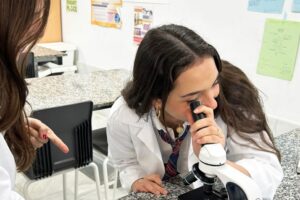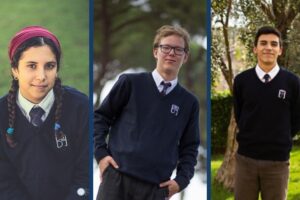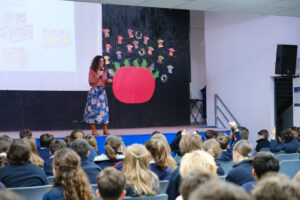
Topic Based Learning – Aprendizaje basado en temas específicos
Topic-based learning is where each curriculum area is connected to a common theme which could last for half a term or continue over a whole term. A topic-based approach to learning aims to ensure that there is creativity in all subjects areas to help engage and motivate pupils. It makes learning more fun and relevant to children; creating links between the curriculum areas and consolidating skills.
Paul Collard, the chief executive of Creativity, Culture and Education said «Creative learners are curious, disciplined, resilient, collaborative and imaginative. Creative teaching nurtures and develops these skills by creating a learning environment in which pupils are challenged, rather than directed, where learning is relevant to their lives.»
More and more schools in the UK are using the topic-based approach as a way of inspiring their students. Schools have found that through this approach the children are covering the necessary objectives set out by the National Curriculum through fun and practical activities and that the children are more focused and involved in their learning.
When planning a topic it is important to think about all the possible learning opportunities and how they can be linked to the different curriculum areas. The National Curriculum, for example, suggests that during the year in Literacy children should write recounts and poetry so, at CBS in KS1 we decided to cover these two elements during our topic ‘ Polar Regions’. We thought it would be a good opportunity for the children to write diary entries imagining they were an explorer crossing the Antarctic and write descriptive Ice poems. It makes sense that the quality of their writing would be better if they had learned about where Antarctica is and what it is like in geography and that they had discovered the experiences of famous explorers throughout time in history. The child’s vocabulary would be richer when writing Ice poems if they had had the opportunity to handle ice and had done experiments about melting in science. The accuracy when conducting these science experiments would also be better if the children have previously learned about time, shape and measuring in maths. Another example would be one of our topics, Kenya. The N.C outlines that in P.E children should cover dance, in art, sculpture and in music, singing and playing instruments so during this particular topic we would cover this by doing tribal African dancing, making typical Kenyan masks and pots with clay and singing traditional Kenyan songs and making our own African instruments.
In British schools abroad where, for the majority of students English is not their first language topic-based learning helps to extend and enrich their vocabulary, generate questions and also gives children a greater subject knowledge which creates more discussion in lessons which is all extremely beneficial for their language development. An Ofsted report into Excellence in English found that schools which had an ‘inappropriate or dull curriculum will not inspire pupils or generate high standards’.
In secondary education and in the workplace people are increasingly expected to be creative thinkers, in order for them to be able to access all available opportunities in life it is important they learn these skills from a young age. We hope that through this topic-based approach (to quote the C.B.S motto) children will ‘enjoy learning to be happy tomorrow’.
Miss Katie
KS1 Coordinator
El aprendizaje basado en temas específicos implica que cada área del currículum está conectado a un tema en común que tiene como duración, como mínimo, la mitad de un trimestre. Este tipo de enfoque tiene como objetivo asegurar que la creatividad se da en todas las áreas de las asignaturas y de esta forma, se motive a los estudiantes. Se consigue un aprendizaje más divertido para los niños, creando relaciones entre las áreas del currículum y consolidando diferentes habilidades.
Paul Collard, el director ejecutivo de Creativity, Culture and Education (Creatividad, Cultura y Educación), afirma que “Los estudiantes creativos son curiosos, disciplinados, resilientes, colaborativos e imaginativos. La enseñanza creativa alimenta y desarrolla estas cualidades al ofrecer un entorno de aprendizaje en el que todos los estudiantes se enfrentan a un reto, más allá de ser dirigidos. El aprendizaje es relevante para sus vidas.”
Cada vez más escuelas de Reino Unido utilizan el enfoque del aprendizaje basado en temas específicos como una forma de inspirar a los estudiantes. Los colegios descubrieron que a través de este enfoque, los niños alcanzan los objetivos necesarios propuestos por el Currículum Nacional a través de actividades divertidas y prácticas, y que los niños se concentran y se involucran más en el aprendizaje.
A la hora de planificar un tema, es importante pensar en todas las posibles oportunidades de aprendizaje, y cómo estas se pueden relacionar con las distintas áreas del currículum. El Currículum Nacional, por ejemplo, sugiere que durante el curso, en Literacy (Lengua), los niños deben aprender a escribir relatos y poesía. Así, en KS1 en CBS, hemos decidido cubrir estos dos elementos a través del tema ‘Regiones Polares’. Pensamos que podría ser una buena oportunidad que los niños escribiesen textos imaginando que son exploradores que cruzan el Antártico, y que inventaran poemas descriptivos sobre el hielo. Lógicamente, la calidad de sus escritos es mejor si previamente han aprendido sobre la localización de la Antártica en Geografía, o si conocen diversas experiencias de exploradores famosos en Historia. El vocabulario de los niños sería más rico al escribir sus poemas si previamente hubieran tenido la oportunidad de hacer experimentos sobre el derretimiento del hielo en Ciencias. Del mismo modo, para conducir correctamente estos experimentos, deben conocer información sobre tiempo, espacio y medidas en Matemáticas. Otro ejemplo podría ser el del tema ‘Kenya’. El Currículum Nacional señala que en P.E., los niños deben aprender a bailar; en Arte, deben conocer nociones sobre escultura. En música, tienen que cantar y tocar instrumentos; por lo que durante este tema en particular, cubriríamos todos estos objetivos al hacer un baile tribal de África, al crear máscaras y cerámica típica de Kenya y al cantar canciones tradicionales del país mientras tocan instrumentos musicales.
En los colegios británicos en el extranjero, donde la mayoría de los estudiantes no tiene la lengua inglesa como primer idioma, el aprendizaje basado en temas específicos les ayudaría a extender y enriquecer su vocabulario, generar preguntas y crear en ellos un mayor conocimiento en cuanto a la asignatura, lo que crea más diálogos en la clase, algo que es extremadamente beneficioso para el desarrollo de la lengua. Un informe de Ofsted sobre la Excelencia en lengua inglesa descubrió que los colegios que tenían un ‘currículum inapropiado o aburrido no inspiran a los alumnos ni generan estándares altos’.
En Secundaria, así como en la vida laboral, cada vez más es un requerimiento que las personas sean creativas. Para que accedan a todas las oportunidades disponibles en su vida, es importante que aprendan estas habilidades desde que son niños. Esperamos que este enfoque (y citamos el lema de CBS), ayudará a nuestros niños a ‘disfrutar aprendiendo hoy, para que sean felices mañana’.


